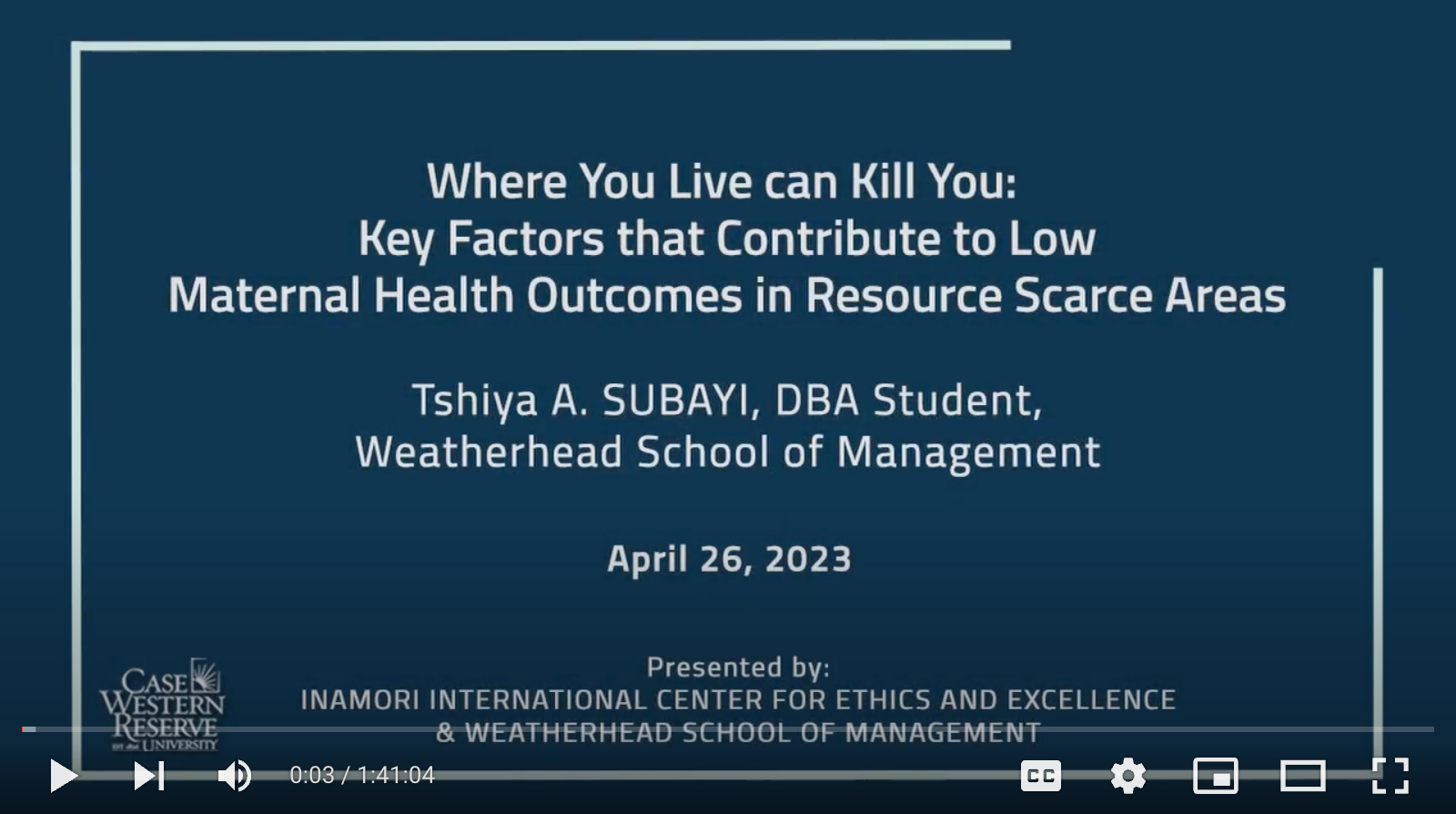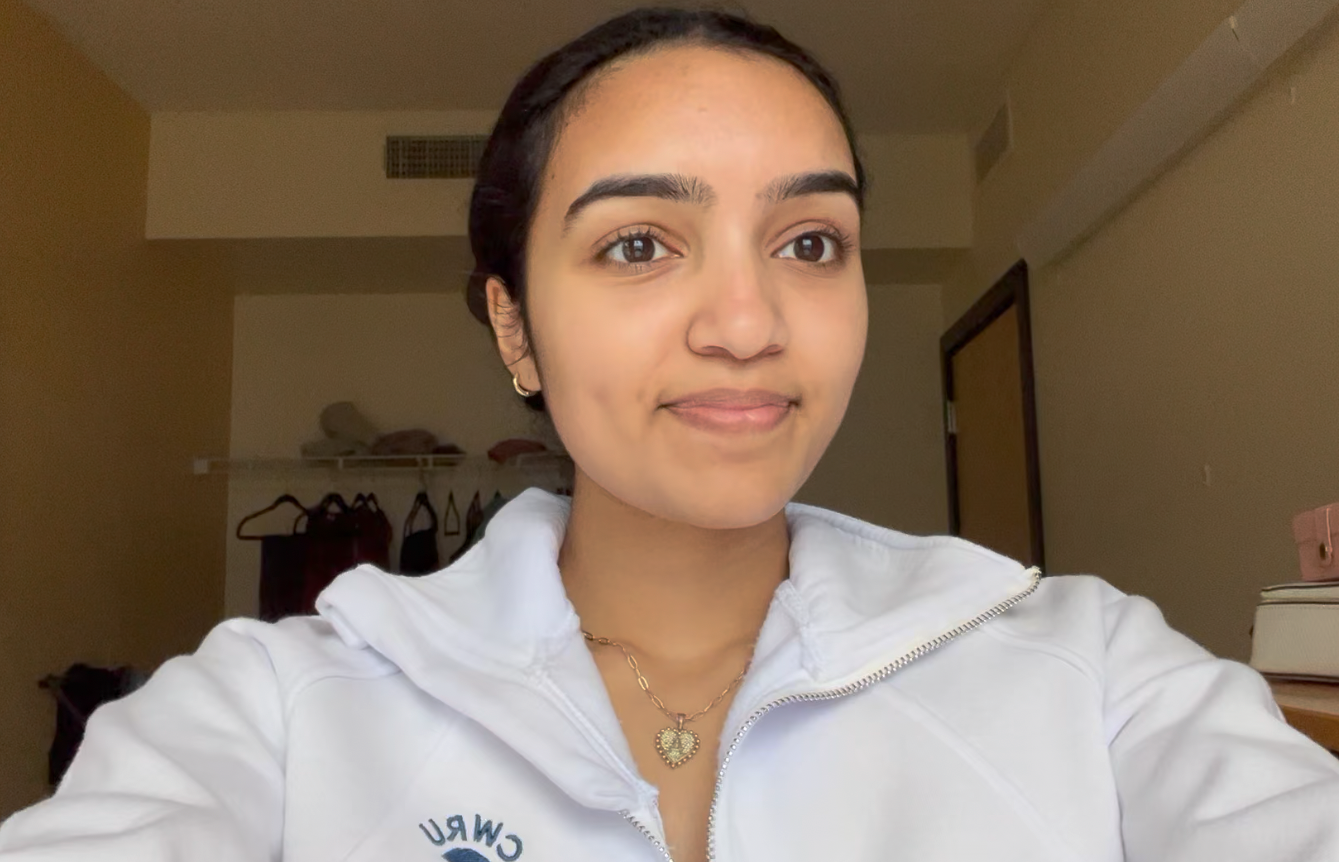Student Conversations and Projects: Local and Global Inequities in Healthcare
As part of the Inamori International Center for Ethics and Excellence’s 22-23 Conversations on JUSTICE series, proposals for funding were enthusiastically welcomed from all CWRU undergraduate, graduate, and professional students. The Inamori Center provided students funding in the form of Conversation Grants to create spaces for conversations about inequities in healthcare and Project Awards to pursue a project about inequities in healthcare.
Congratulations to our winners!
Winners, Project Reports, and Event Videos
Conversations to Promote Advance Care Planning in the Cleveland LGBTQ+ Community
Our first event on advance care planning (ACP) in the Cleveland LGBTQ+ community, hosted on the campus of Case Western Reserve University in the Inamori International Center for Ethics and Excellence, was a tremendous success. In attendance were community members, allies, students, faculty, and clinicians practicing at institutions around the greater Cleveland area. The event started with a short presentation, which introduced the basics of both formal and informal ACP and emphasized the importance of ACP in the LGBTQ+ community. Following the presentation, attendees engaged in a robust and extensive conversation ranging from how to complete advance directives to ways that we can promote proactive conversations about medical wishes and end of life care in the LGBTQ+ community. At the conclusion of the event, attendees were encouraged to take printed copies of advance directives and they received program materials as well as additional resources via email. Our second event on advance care planning (ACP) was hosted at the vibrant Studio West 117 on the last weekend of Pride Month. This venue, which serves as a gathering place for the Cleveland LGTBQ+ community, was the perfect setting for this conversation. The event kicked off with a short presentation on ACP, which discussed the significance of the HCPOA document, declaration for mental health treatment, living will document, and organ donation form. Additional resources for starting and guiding conversations with loved ones about future medical wishes were also shared. Attendees then had the opportunity to engage with other community members in discussions about the importance of ACP. During the event, some attendees completed their advance directives, while many more took copies of the forms home to review with their loved ones. All attendees received a follow-up email with digital copies of the program materials. |
Conversations on How Prevention of Financial Toxicity can Reduce Racial and Socioeconomic Disparities in Cancer Care
With the Inamori International Center for Ethics & Excellence Conversations on JUSTICE grant, in collaboration with the UH Radiation Oncology Department, we held an in-person and live-streamed event titled “Financial Toxicity in America.” The event featured Dr. Fumiko Chino, assistant attending radiation oncologist at Memorial Sloan Kettering Cancer Center. Inspired by her late husband’s cancer journey, she is a leading researcher in the field of patient cost and affordability. Her presentation started by describing financial toxicity as a side effect of cancer treatment—which includes utilizing savings, cutting back on essentials like food, selling one’s house, etc.—to pay for treatment. On the other hand, patients will also reduce the amount of medication they are taking or stop treatment altogether because they cannot afford it. However, physicians are often unaware their patients are facing challenges to pay for their treatment. Communities of color and migrants are the most negatively impacted by the cost of cancer care, contributing to disparities in health outcomes. Dr. Chino emphasized the importance of discussing concerns about financial toxicity with patients early in the treatment course, similar to any other side effect, so patients are more aware and able to seek help earlier. She also described how we as healthcare workers can have a crucial voice in state and national legislature by meeting with our members of Congress to push for equitable healthcare, insurance, and drug cost legislation.
Following the event, we hosted a small group lunch for residents to chat with Dr. Chino about career advancement and academic medicine. Overall, I enjoyed Dr. Chino’s passion for the subject and will continue to consider how we can help our patients manage the cost of care without jeopardizing their own health and wellbeing. |
Conversations on Factors that Contribute to Low Maternal Outcomes in Resource Scarce Areas
Brief report by Tshiya Subayi, DBA 2023, Weatherhead School of Management, Inamori Center Grant Recipient There is an estimated 139 million women who give birth around the world each year. Sadly 289,000 die at during childbirth and another 2.1 million continue to suffer long lasting morbidity which sometimes leads to more deaths. Despite the advancements made in the medical field, women continue to die during childbirth particularly in resource scarce areas. Those deaths are not due to disease alone; they are due to limited access to basic health services. Indeed, research say that the social determinants of health contribute to 80% of the causes for morbidity during childbirth for women 15 to 49. Within the social determinants four key drivers constitute the greatest barriers: education, distance, income and utilization of health services. If we want to slow that rate at which women die this survival cluster must be address and society must continue to find ways to make child delivery safe and equitable for all. We discussed these aspects in a conversation about justice sponsored by the Inamori International Center for Ethics and Excellence. The conversation brought together a panel with mixed experience and expertise: a policy maker formally with the World Bank, a practicing physician from Metrohealth in Cleveland, a PhD candidate from Weatherhead School of Management and a obstetrician with international experience working with the World Bank and the World Health Organization to discuss the recent surge in maternal morbidity/mortality in the United States. The conversation centered around three key themes: (i) women healthcare workforce, (ii) the use of information technology for the benefit of women’s health and (iii) highlight ways in which both individually and collectively we can break down barriers to access and support policy formulation that are more women centered. The conversation highlighted 5 key points:
Dr. Mahmoud Fatallah from Egypt summed up the inequality in maternal mortality in this way: “Women are not dying because of diseases we cannot threat women are dying because society has yet to make the decision that they lives are worth saving” (2006). |
Project: Medicare for All Resolutions
Watch Amber's Video Report Here
|
Project: Intersection Between Race and Genetics in Alzheimer’s disease in the United States
Late-onset Alzheimer’s disease (LOAD) is an incurable neurodegenerative disorder most typically presenting as selective memory impairment with insidious onset in those age 65 or older. Factors affecting LOAD risk may arise from genetic contributions (genetic ancestry, variant forms of genes such as APOE or ABCA7), environmental contributions (traumatic brain injury, exposure to air pollution and heavy metals), and/or a combination of the two. Although many LOAD risk factors are characterized in the literature, ethical considerations, appreciation for population differences, and drivers of health disparities such as the intersection between race and ethnicity, racism (internalized, interpersonal, systemic, institutional), and LOAD risk remain under appreciated. This literature review seeks to explore this intersection, identify limitations in current conceptualizations of the social constructs of race and ethnicity and the biological construct of genetic ancestry in research and medicine, and propose methods to address these limitations. |
Call for Proposals: Local and Global Inequities in Healthcare
As part of the Inamori International Center for Ethics and Excellence’s 22-23 Conversations on JUSTICE series, proposals for funding are enthusiastically welcomed from all CWRU undergraduate, graduate, and professional students. The Inamori Center will provide students funding in the form of Conversation Grants to create spaces for conversations about inequities in healthcare and Project Awards to pursue a project about inequities in healthcare.
Types of Funding
Funding for Conversation Grants may be used for speaker fees, space rental, MediaVision services, or other related event expenses. Grant proposals can be submitted by an individual student, a group of students, or a student-led organization. Conversations can be held in-person or virtually, but must be completed during the Spring 2023 semester (by May 12, 2023). A limited number of grants up to $1000 will be awarded.
The Inamori Center will help promote the event, as applicable, through our regular communication channels. While not required, the Inamori Center space in the Tinkham Veale University Center, as available, may be used to host conversations. The Inamori Center will work with each Conversation Grant recipient to facilitate payment of event expenses, either made directly by the Inamori Center or through reimbursement to the student(s) with detailed receipts. Please note: Grants do not include technical, logistical, or event assistance.
Funding for individual Project Awards will be made to recognize and support service, scholarship, and research projects that can be completed in the Spring 2023 semester (by May 12, 2023). Proposals can be submitted by an individual student. Awards should help support a new endeavor and should be unrelated to a course requirement. A limited number of $500 and $1000 awards will be made in the form of an individual honorarium made directly to the student.
Award funds may be retained by the student and/or used toward project expenses. 50% of funding will be made available at the start of the project. The remaining funding will be made available upon acceptance of the final report. Please note: Awards do not include technical or logistical assistance.
Inequities in Healthcare: Locally and Globally
We are interested in local and global perspectives and supporting conversations and projects on topics that address the intersection of ethics, values, justice, and healthcare. The following topic examples are meant to be illustrative and are not exhaustive:
- Standards of Care that Encompass All Bodies
- Shared Decision-Making for LGBTQ+ Families
- Transgender Patient Experiences and Their Rights
- Diversity and Inclusion in Healthcare Professions
- Life Expectancy and the Cost of Healthcare: Why Your Zip Code Matters
- Ethics of Emerging Technologies in Healthcare
- Engaging Underserved Communities with Healthcare Systems
- Systemic Racial and Socio-Economic Disparities in Healthcare Access
- Professional Culture Issues in Hierarchical Healthcare Systems
- Unethical Practices: Health Insurance, Employment, and Inequity
- Equity Issues Affecting Maternal Mortality Rates
- Disparities in Health Statistics Among Underrepresented Populations
While not required, we are also interested in funding conversations or projects that relate to the efforts of Inamori Ethics Prize winners or to Dr. Paul Farmer who was chosen to receive the 2022 Inamori Ethics Prize before his untimely passing. Each of these individuals have greatly improved the condition of humankind in their own unique ways; each affecting inequities in healthcare in some way as well: including making scientific advancements; creating greater access to healthcare; and advocating to ensure all people are treated humanely.
Application Details
Proposals may be submitted via this application form. Those received by January 20th will receive priority consideration. Proposals will be accepted until January 31st.
Reporting
Upon completion of the Conversation Grant or the Project Award, a one-paragraph (minimum) written summary or one-minute (minimum) video summary, suitable for sharing online, must be submitted to inamoricenter@case.edu no later than June 1, 2023. All expenses must be processed by the end of the fiscal year on June 30, 2023.
Resulting publications and presentations from Conversation Grants or Project Awards should acknowledge the support of the Inamori International Center for Ethics and Excellence. Please submit copies of any acknowledgements to inamoricenter@case.edu.



